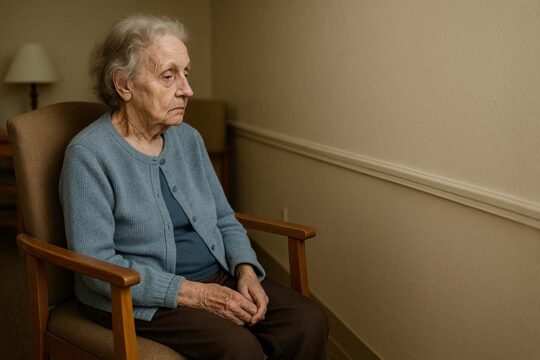
7 Stages of Frontotemporal Dementia
What to Expect with Frontotemporal Dementia
At Stellar Care, our dementia care services enable your loved one to maintain a life filled with dignity, purpose, and to receive the compassionate, individualized care they deserve. If you notice any signs and symptoms of frontotemporal dementia in your loved one or if there is a history of it in your family, you will want to educate yourself about this disease so you can support your loved one and make a plan for their care.
What is Frontotemporal Dementia?
Frontotemporal Dementia is a progressive disorder that causes damage to neurons in both the frontal and temporal lobes of the brain. The affected areas of the brain, which are linked to personality, behavior, language and movement, can have a significant impact on an individual’s quality of life. Over half of people who develop this disease have no prior family history of dementia and it is the second most prevalent cause of dementia in people under 65. It is sometimes called Pick’s disease.
Frontotemporal Dementia Causes
The cause of Frontotemporal Dementia is unknown. Abnormal proteins called Tau and TDP-43 build-up in the brain which damages the neurons causing the frontal and temporal lobes of the brain to shrink. Several genetic mutations have been linked to FTD. Currently, the only known cause of this disease is having a family history of it, however the vast majority of people diagnosed with FTD have none.
Symptoms of Frontotemporal Dementia
Those affected suffer from extreme changes in their personality, may become socially inappropriate, impulsive or emotionally indifferent. Others affected lose their ability to use language properly. Frontotemporal dementia symptoms can vary widely and manifest differently from person to person. Some of the symptoms include:
- Middle stage symptoms: In the middle stage, symptoms show an increasing need for assistance with basic daily tasks like bathing, dressing or grooming,
- Late stage symptoms: Memory issues and cognitive decline progresses causing the need for more monitoring and daily care.
- End of life symptoms: As the disease advances to end stage, symptoms become more pronounced. These may include severe cognitive impairment, irritability, aggression, difficulties with mobility, tremors, advanced memory loss, difficulty with language and impaired decision-making. Muscle weakness can also present as a symptom. The progression of symptoms can vary in each person. Those who suffer from end stage FTD are at risk for falls and infections like pneumonia.
How is Frontotemporal Dementia Diagnosed?
Frontotemporal Dementia is challenging to diagnose because the symptoms overlap with other conditions. There is no one single test used to diagnose it. Tests are often conducted for reasoning and memory skills. This type of testing can be helpful to determine the type of dementia at an early stage and may help distinguish frontotemporal dementia from other types. It can often be misdiagnosed as Alzheimer’s disease or as a psychiatric problem.
Physicians look at family medical history and often order genetic testing. Brain scans like MRI or pet scans can sometimes show areas of the brain where nutrients are poorly metabolized. Researchers are studying biomarkers to determine if any can be used to measure disease progression.
The types of frontotemporal dementia are:
Behavioral variant FTD: This type affects personality, judgment and behavior. Impulsive behaviors are common
Primary Progressive Aphasia (PPA) : There are two types.
Semantic variant: The patient can present with memory loss, trouble with language and communication, behavioral changes, irritability, trouble sleeping, depression, difficulty with the meaning of words, and emotional withdrawal. They often present with compulsive behaviors and selective eating (Also Read: What To Do When Elderly Parent Stops Eating).
Non-fluent variant: Patients may show difficulty with speaking. Grammar is misused and speech sounds are distorted. The patients are often confused by long sentences.
7 Stages of Frontotemporal Dementia (FTD)
- 1. Mild Cognitive Changes: These include subtle personality or behavioral changes and mild memory difficulties.
- 2. Changes in Behavior: In this stage, individuals may exhibit difficulties with problem-solving, lack of motivation, emotional blunting and language problems.
- 3. Language Difficulties: Symptoms begin to interfere with daily functioning and behavioral changes become more pronounced. Language problems worsen.
- 4. Implications of Quality of Life: Behavioral problems become more difficult to manage and memory problems may be evident. Assistance with daily living is needed and language problems accelerate.
- 5. Personality Changes and Mood Swings: Individuals may experience profound cognitive and functional decline and have limited speech. Behavioral symptoms often worsen leading to a need for all aspects of care, including eating and mobility.
- 6. Memory Deterioration: The patient may lose the ability to walk, sit and communicate. Overall general health declines.
- 7. Severe Cognitive Impairment: Physical decline continues and complications may arise. PThis usually lasts for several months and individuals may become unresponsive. They may become immobile and need round-the-clock care.
Frontotemporal Dementia Treatment
Families with loved ones who are suffering with this disease will want to know what to expect with frontotemporal dementia. Unfortunately, there is currently no cure for this disease and no way to slow down the progression or prevent the onset. Treatment revolves around treating the symptoms and improving the patient’s quality of life.
In early stages, sometimes the family is in denial about dementia prognosis. Symptoms may not be immediately recognizable or consistent. It’s important for family members to seek and receive support so they can better understand the disease and its progression.
Antidepressants or antipsychotics can be given to manage the symptoms of FTD such as depression, mood swings or behavioral problems.
Behavioral and psychological interventions can be used to manage challenging behaviors which involve modifying the environment, establishing regular routines, providing structured activities and using positive reinforcement techniques.
Speech and language therapies can assist in trying to improve communication skills.
Occupational therapists help develop strategies to maintain independence and manage daily activities as cognitive abilities decline.
Emotional support and counseling sessions can provide guidance, education, and coping strategies.
Families should work with healthcare professionals to develop a comprehensive care plan customized for your loved one’s individual needs. Most patients will need a higher level of care than their family can provide. During some point in the progression of this disease, the patient will likely need 24-hour care so it’s important to plan ahead for when this stage happens and be prepared.
Frontotemporal Dementia: Rapid Progression
In cases of rapid progression, individuals experience a faster decline in cognitive abilities and behavioral dysfunction. Treatment depends on the underlying cause which may be difficult to determine. Unfortunately, for many cases of rapid progression dementia, there is no cure. Many conditions can cause rapid progression such as:
- Autoimmune diseases
- Other neurodegenerative diseases
- Infections
- Impaired blood flow to the brain
- Vitamin deficiencies
- Cancer
- Toxicity from prescription medications
- Recurrent seizures
While rapid progression has no official treatment, sometimes patients can be made more comfortable and their quality of life can be improved, depending on their circumstances.
Frontotemporal Dementia and Eating Habits
In early stages, individuals may present with changes in appetite, food preferences, and meal patterns. In some cases, a preference for sweets may develop. If your loved one stops eating, you may be concerned about if they are getting the proper nutrition. A dietician can help ensure that proper meals are being provided.
Swallowing difficulties can occur in advanced stages of FTD increasing the risk of choking or aspiration. FTD can affect the brain regions responsible for coordinating the swallowing process leading to a reduced ability to chew and safely swallow.
Related Articles
Types of Dementia and Dementia-Related Diseases
Discover the key differences between retirement homes and assisted living to help you choose the right care for your loved one’s needs.
Learn the risks of leaving a dementia patient alone, legal responsibilities, care strategies, and how to plan for their safety.
Learn why dementia patients wander at night, how to prevent it, and when memory care is the safest option for your loved one in San Diego.
Compare memory care and assisted living, from services and costs to safety and staffing, to find the right senior care in San Diego.



